Data Science vs. Big Data vs. Data Analytics – Know the Difference
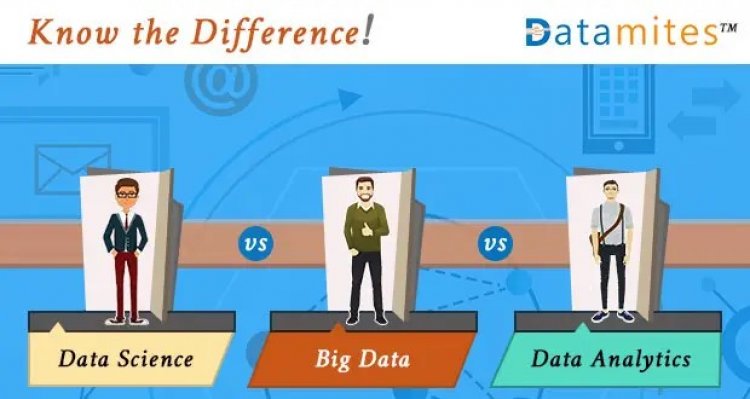
Data is rapidly growing along with the speed of technology advancements. More data has been created in the recent few years than in the entire previous history of the human race.
Do you know that an approximate of 1.7 MB of new information will be generated every second by the year 2020????
Remember, big data is not a fad but is a revolution which has begun and with no doubt, it will soon touch upon each business. Along with the data volume, our ability to analyze it efficiently to derive useful business insights is also growing, and in the next five years, we can expect even in startups there will be some form of data analytics working and kindling the business growth.
The professionals embarking on a career change, often get confused and unsure of the difference prevailing in Data Analytics, Big Data Analytics, and Data Science.
Do not worry, we have our ear to the ground and that is why we decided to come up with an article that clearly explains the difference between all these buzzwords and also the career associated with them.
Data Science Vs Big Data Analytics Vs Data Analytics
Let’s first see what does each term precisely means and then we see their applications.
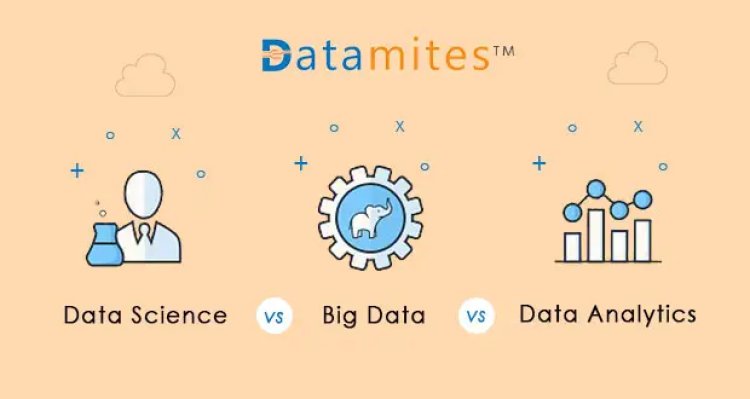
What is Data Science?
Data Science is an interdisciplinary field embracing all that is associated with structured and unstructured data, starting with preparing, cleansing, analyzing and deriving useful insights. It is a combination of mathematics, statistics, intelligent data capture, programming, problem-solving, data scrubbing, different perspectives of looking at things, preparation and data alignment.
In a nutshell, it is the combination of several techniques and process working on data to gain knowledgeable business insights. By using scientific methods, algorithms, processes, and systems to effectively extract information that can be used by business to make crucial business decisions.
Find out more topics covered about data science in our previous article “What Is Data Science And Why Now?”
What is Big Data?
If we say, Big Data, we are not talking about data stored on one computer, instead, the humungous volumes of non-aggregated raw data stored in different places with its size varying up to petabytes. With more and more data getting generated every millisecond from various sources, data doesn’t come in standard form but has been produced in varieties of form. In fact, 80% of the data generated today are unstructured, and it is highly impossible to handle them efficiently only by using traditional technologies.
In earlier days, the amount of data generated was not high and we kept archiving them, and was performing an only historical analysis. However, one important thing to keep in mind is that “Big Data is something that is very important be to analyzed for so that we can derive at useful insights to make better and strategic business moves.”
The World’s leading global research and advisory company, Gartner is defining Big Data as “High-volume, and high-velocity and/ or high variety information assets that need forms of information processing that are cost-effective and innovative and can allow enhanced decision making, insight and process automation.”
What is Data Analytics?
Data Analytics is the process that involves an application of algorithmic or mechanical procedures to derive at useful business insights. The techniques and technologies of Data analytics are widely used in industries to make informed decisions to verify or disapprove the current models and theories.
Have a peep at “5 Reasons, Why One Should Learn Data Analytics?” for more clarity.
Applications of Data Science vs. Big Data vs. Data Analytics:
Lets now dive on the applications of each category
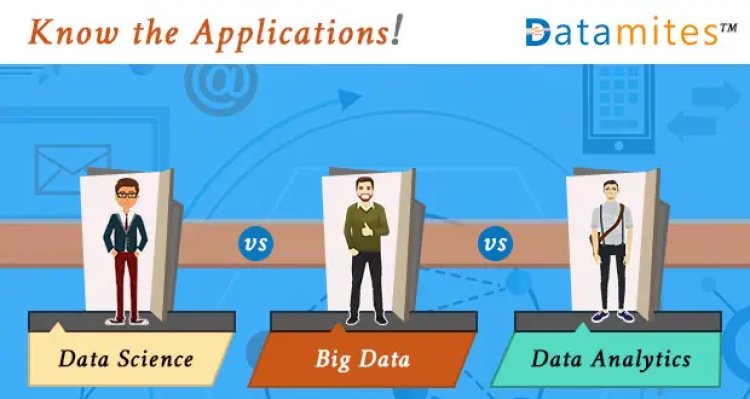
Applications of Data Science:
1) Recommender systems: The Recommender systems can predict whether a particular user would prefer to buy an item and also help them quickly find the relevant products. Many industry giants such as Amazon are using recommender systems to promote their suggestions and products according to the user’s preference by using their previous search results.
2) Digital Advertisement: Digital ads are the latest trend and also the ones that obtain higher CTR than the conventional forms of advertisements. Be it a flashy display banner or an interactive digital billboard, Digital science algorithms is the one sitting behind the success of these digital ads.
3) Internet search: Search engines can get you any result in just a fraction of a second. Ever thought what is the one that has been used for this accuracy??? Data Science.
Applications of Big Data:
Retail: Retail business has become increasingly tough with the market facing stiff competition. The business owners are often in a look out for channels to understand and serve the customer better. With the huge amount of data spanning every second, proper analysis of all data coming from social media, loyalty program, customer transaction, and other sources can help them to attain a competitive edge.
Communications: Telecommunication service providers analyze the huge amount of data lying with them to make crucial business decisions such as expanding customer bases.
Financial services: Almost all top-tier financial organizations ranging from insurance to retail banks, cook on big data for their financial services. The significant challenges faced by these financial companies is their enormous chunk of multi-structured data lying in different systems. Analysing the big data can help them in many ways such as customer analytics, fraud analytics, compliance analytics and operational analytics.
Applications of Data Analytics:
1) Energy management: Most of the companies use Data analytics for energy management which includes smart-grid energy, building automation in utility companies, energy optimization, and energy distribution. The primary focus is on managing the service outages, monitoring and controlling of network devices and dispatch crews. Integrating millions of data points within the network performance of Utilities lets the engineers monitor their networks by utilizing analytics.
2) Healthcare: Cost pressures are the major challenge faced by hospitals and that is what restricting them from treating many patients effectively. Machine and instrument data proves to be beneficial in tracking and optimizing the treatment as well as the patient flow and use of equipment can be tracked. This helps in improved quality of care and a predicted gain of 1% efficiency yielding a savings of over $63 billion in healthcare worldwide.
3) Gaming: Collecting data to optimize and spend within across games is the primary advantage of data analytics in Gaming. Those companies into manufacturing of games gain better insights of user likes, disliked and the relationships.
4) Travel: We can optimize the buying experience via weblog analysis, mobile data analysis and social media using Data Analytics. What customer prefers and desires can be extracted. Tailored offers and packages can be promoted in accordance with the subsequent browsing of the customer that would help the company to achieve better conversions.
What are the required skills for the professionals entering each of these?
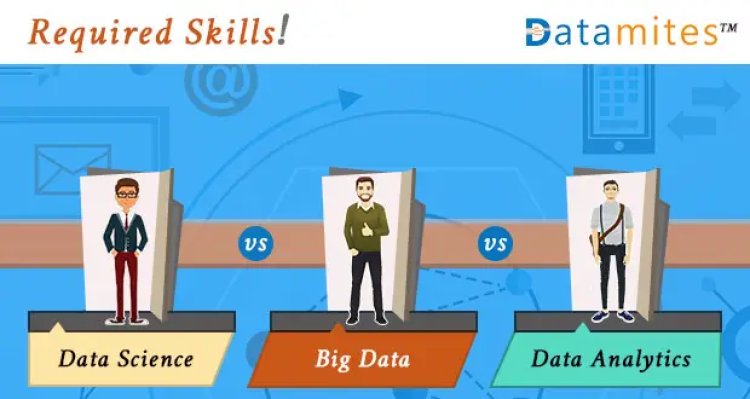
To become a Data Scientist:
1) First, let us have a look at degree qualifications for a Data Scientist job. When it was analyzed among professionals working as Data Scientists, we were able to see that 46% of them hold a Ph.D. and 88% of them hold a Master’s Degree.
2) Next comes the most essential requirement, Data Scientists should know how to handle unstructured data. It might be an audio or social media or even video footage, irrespective of its structure they need to work on it to gain useful insights.
3) In-depth knowledge of the R or SAS programming is necessary but generally, R is preferred.
4) Knowledge of Python coding will definitely help them as it is commonly used but in rare cases others like Perl, Java, C/C++, etc. Is needed.
5) Good knowledge of Hadoop platform helps and also some experience in Pig or Hive too.
6) Though SQL coding is not a significant part of the job but writing and executing complex queries in SQL will be beneficial.
If you are looking for data science courses in Bangalore, contact Datamites.
To become a Big Data professional:
1) The most necessary skill for all big data, data science, and data analytics professionals is Mathematics and statistical skills.
2) Your strong Analytical abilities will help you to dwell the hidden meaning out of huge chunks of data that you have got. It helps you to find the most relevant data required to solve a problem on the ground.
3) Algorithms for processing data to gain valuable insights are indeed performed using computers, so coding knowledge is essential.
4) Your creativity will help you to look at and analyze the data uniquely and come up with new methods.
5) Clear understanding of various business objectives, its process, and background are essential.
To become a Data Analyst:
1) Statistical and Mathematical skills are essential, to be specific having the knowledge of Inferential and descriptive statistics along with experimental designs helps.
2) Excellent programming skills and knowledge of R and python is essential.
3) Data handling skills will allow you to manage the data efficiently and convert to convenient for consumption.
4) Take the road of Data analysts and start thinking like them.
5) Data Visualization and Machine learning skills will help you in Data Analyst career.
Communication skills.
What are the salaries associated with each skill?
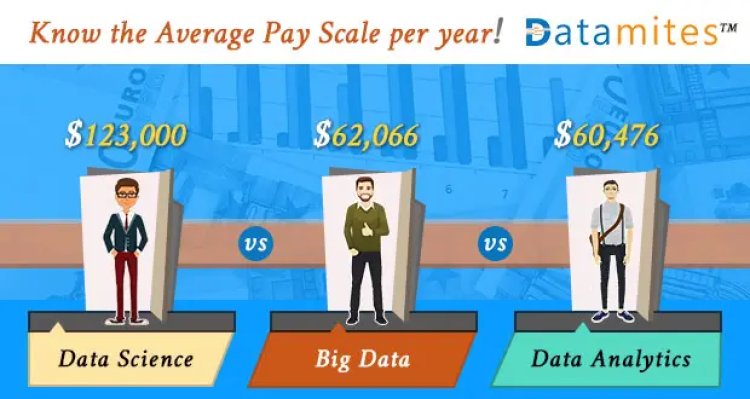
Here comes our most lucrative part of the article, “paycheque”. So, how much salary cheque do each professional will take home?
1) As per Indeed.com, data scientist earns an average of $123,000 per year. Glassdoor is quoting it as $113,436 per year.
2) Big Data specialist’s average salary according to Glassdoor is $62,066 per year.
3) A Data analyst’s average salary according to Glassdoor is $60,476 per year.
We can very well say that Data is crude oil, it is in our hands to extract petrol from it so that it turns out to be profitable. Data Science, Data Analytics, and Big Data have already started rocking the world. Importantly, these latest trends are opening doors for many new job opportunities and the demand for the professionals with the right skill set is about to explode soon.
For a Data related course, it is essential that you need to know in which team you fit it, i.e., “Researchers or Analysts or Big Data specialists. If you have no clear idea on this, we have an article “Data Science Team Structure – Where Do I Fit?” already published in our blog site and it would be beneficial for you.
DataMites™, a global institute for Data Science accredited by the International Association of Business Analytics Certifications (IABAC) understand the challenges faced by professionals who aspire to enter a successful career in a fascination Data world. At DataMites™, we have industry-specific training programs specially crafted to guide fresh graduates and working professionals in their initial steps. Industry experts design all our Data Science training programs in alignment with the latest industry trends and in addition to this, we offer
- A case study based approach that helps you to master the concepts with hands-on experience over projects to gain real-time exposure.
- A library of resources such as books, publications, newsletters, and much more are available round the clock.
- Flexible learning options such as instructor-led, self-learning and classroom sessions.
- A practice lab available round the clock with popular platforms to practice on sample problems and case studies.
- A dedicated team assigned to help you to find the right job after you complete the course.
The challenges faced by businesses across the world is “efficient talents with the relevant skill set for meeting their requirements.” DataMites™ have come up with tailored training programs to gain relevant skills. Please visit our site https://datamites.com/data-science-training/certified-data-scientist/ to look at various Data Science courses available with us.
So, all we need now is “your attention” but, if you are one among the professionals who choose to ignore these concepts, then be ready to be outrun in coming years. Now the question isn’t “whether the data world will stay or fade away?” instead the real question is “are you ready for it?”.
For Data Science courses please visit below pages based on your preferred city,
Hyderabad: https://datamites.com/data-science-course-training-hyderabad/
Pune: https://datamites.com/data-science-course-training-pune/
